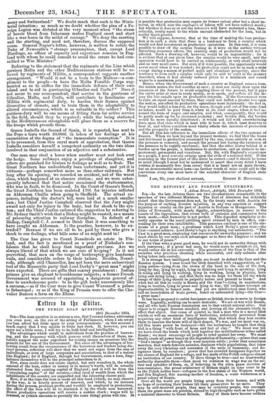Ittttro to tht et[itta.
TILE PUBLIC LOAN QUESTION.
10th December 1854.
Sm—The loan question is so serious a one, that I cannot forbear addressing you even now, on the eve of the sitting of Parliament, when I am aware you lean afford but little space to your correspondents : on this account I much regret that I was unable to write last week. If, however, you can spare me a little room, I will try to be both brief and intelligible.
The advantages which result to individuals from the practice of borrow- ing, and the frequency with which persons avail themselves of them, na- turally suggest the same expedient for raising money on occasions like the present for the use of the Government. But since all the advantages of bor- rowing result from the circumstance of the borrowers and lenders being dis- tinct persons, reflection will show that we must not argue from the case of individuals, or even of large companies and associations, to that of a nation like England ; for if England, through her Government, raise a loan, Eng- lishmen themselves will be the principal subscribers to it. Now, since credit does not create capital, but only transfers it, the whole amount of the loan, either in money or in money's worth, will be actually abstracted from the existing capital of England ; and it will be from the "circulating capital" of the country,—that fund of wealth from which the inhabitants of the country are supported and the labouring classes paid.
Now, if at the time the loan is made all this fund (which, we may observe by the way, is in hourly process of renewal, and which, by its increase during the process, produces profits and wealth) be employed in production, the effect of the loan will be to diminish it by the whole sum borrowed. Hence productive operations will receive a sudden cheek; wages will be lowered, or (which amounts to precisely the same thing) prices will rise. Di
is possible that production may regain its former extent after but a short in- terval, in which case the employers of labour will not have suffered much ; but whether it does so or not the labourers will have sustained a loss, theo- retically, nearly equal to the whole amount abstracted for the loan, but in reality much greater. We will suppose, however, that at the time of making the loan produc- tion is in such a state that! there is a tendency to form a surplus which would not find investment in productive operations. In this ease, if it were possible to draw off the surplus floating as it were an the surface without disturbing monetary affairs, the existing state of production would not be affected. Such a drawing-oil; however, would be an impossibility ; for it is evident that at any given time the surplus would be very small, and the operation would have to be carried on continuously, at very short intervals and on very small sums. But even if it were possible, the opportunity would never occur when it was wanted; for production could not be in such a state except during a season of perfect quiet and abundant prosperity, since the tendency to form such a surplus could only be said to exist in the manner described, when it had already reduced prices to a minimum and raised wages to a maxim= point.
Hence, when the Government of such a country as England raises a loan, the nation makes the full sacrifice at once; it does not really draw upon the resources of the future to avoid crippling those of the present, but it pays the entire price at once in ready money, so to speak, and suffers all the in- jury the loss entails upon its productive interests. If the Government were to raise an equal amount by taxes, they could not inflict a greater loss upon the nation, nor affect its productive operations more injuriously : the fact is, they would inflict a less evil, for the taxes, though paid out of the same fund as before, would be paid, from it when in its later stages, when it had as- sumed the form of wages and salaries, and when, consequently, they would be partly made up for by increased economy ; and besides this, the burden would be more equally distributed ; it would not fall with overwhelming force upon that class which is least able to bear it, which least deserves to bear it, and whose condition most vitally affects the interests of production and the prosperity of the nation.
But all this has reference to the immediate effects of the two systems of finance. When we look beyond the present moment, we find that the losses and detriment to production occasioned by the one, cease entirely as soon LIS the pressure is removed, and permit the ground lost during the existence of the pressure to be rapidly recovered ; but that the other leaves behind it burden upon the people, a hinderance to production, and an obstacle to im- provement, permanent and vexatious. But, Sir, with England's experience as a people, I need scarcely enlarge upon the evils of a national debt. If the reasoning in the former part of this letter be correct—and it should be borne in mind (though I must not be understood to assert that every detail I have written is necessarily free from error) that it is based not on mere theory, but on demonstrable moral laws—no further words of mine could add to the conviction every one must have of the suicidal character of English state loans.


































 Previous page
Previous page